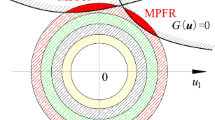Abstract
Hybrid reliability analysis (HRA) with both random and interval variables is investigated in this paper. Firstly, it is figured out that a surrogate model just rightly predicting the sign of performance function can meet the requirement of HRA in accuracy. According to this idea, a methodology based on active learning Kriging (ALK) model named ALK-HRA is proposed. When constructing the Kriging model, the presented method only finely approximates the performance function in the region of interest: the region where the sign tends to be wrongly predicted. Based on the constructed Kriging model, Monte Carlo Simulation (MCS) is carried out to estimate both the lower and upper bounds of failure probability. ALK-HRA is accurate enough with calling the performance function as few times as possible. Four numerical examples and one engineering application are investigated to demonstrate the performance of the proposed method.












Similar content being viewed by others
References
Au S, Papadimitriou C, Beck J (1999) Reliability of uncertain dynamical systems with multiple design points. Struct Saf 21:113–133
Balesdent M, Morio J, Marzat J (2013) Kriging-based adaptive importance sampling algorithms for rare event estimation. Struct Saf 44:1–10
Bect J, Ginsbourger D, Li L et al (2012) Sequential design of computer experiments for the estimation of a probability of failure. Stat Comput 22:773–793
Bichon B, Eldred M, Swiler L et al (2008) Efficient global reliability analysis for nonlinear implicit performance functions. AIAA J 46:2459–2468
Bichon B, McFarland J, Mahadevan S (2011) Efficient surrogate models for reliability analysis of systems with multiple failure modes. Reliab Eng Syst Saf 96:1386–1395
Du X (2007) Interval reliability analysis. In: Proceedings of the ASME 2007 Design Engineering Technical Conference and Computers and Information in Engineering Conference, Las Vegas, Nevada, USA
Du X (2008) Unified uncertainty analysis by the first order reliability method. J Mech Design (ASME) 130:1401–1410
Dubourg V, Sudret B, Bourinet J-M (2011) Reliability-based design optimization using kriging surrogates and subset simulation. Struct Multidiscip Optim 44:673–690
Dumasa A, Echard B, Gaytona N et al (2013) AK-ILS: an active learning method based on kriging for the inspection of large surfaces. Precis Eng 37:1–9
Echard B, Gayton N, Lemaire M (2011) AK-MCS: an active learning reliability method combining kriging and Monte Carlo simulation. Struct Saf 33:145–154
Echard B, Gayton N, Lemaire M et al (2013) A combined importance sampling and kriging reliability method for small failure probabilities with time-demanding numerical models. Reliab Eng Syst Saf 111:232–240
Elishakoff I (1995a) Essay on uncertainties in elastic and viscoelastic structures: from A M. Freudenthal’s criticisms to modern convex modeling. Comput Struct 56:871–895
Elishakoff I (1995b) Discussion on: a non-probabilistic concept of reliability. Struct Saf 17:195–199
Elishakoff I (1999) Are probabilistic and anti-optimization approaches compatible? whys and hows in uncertainty modelling: probability, fuzziness and antioptimization. Springer, New York
Gablonsky J (1998) Implementation of the DIRECT Algorithm. Center for Research in Scientific Computation, Technical Rept. CRSC-TR98-29, North Carolina State Univ, Raleigh, NC, Aug
Guo J, Du X (2009) Reliability sensitivity analysis with random and interval variables. Int J Numer Methods Eng 78:1585–1617
Guo S, Lu Z (2002) Hybrid probabilistic and non-probabilistic model of structural reliability. Chinese J Mech Strength 24:524–526
Huang B, Du X (2008) Probabilistic uncertainty analysis by mean-value first order saddlepoint approximation. Reliab Eng Syst Saf 93:325–336
Jiang C, Lu G, Han X et al (2012) A new reliability analysis method for uncertain structures with random and interval variables. Int J Mech Mater Des 8:169–182
Jones DR, Schonlau M, Welch WJ (1998) Efficient global optimization of expensive black-box functions. J Global Optim 13:455–492
Kaymaz I (2005) Application of kriging method to structural reliability problems. Struct Saf 27:133–151
Lophaven S, Nielsen H, Sondergaard J (2002) DACE, a matlab Kriging toolbox, version 2.0. Tech. Rep. IMM-TR-2002-12; Technical University of Denmark.
Luo Y, Kang Z, Alex L (2009) Structural reliability assessment based on probability and convex set mixed model. Comput Struct 87:1408–1415
Luo X, Li X, Zhou J et al (2012) A Kriging-based hybrid optimization algorithm for slope reliability analysis. Struct Saf 34:401–406
Möller B, Beer M (2008) Engineering computation under uncertainty - capabilities of non-traditional models. Comput Struct 86:1024–41
Picheny V, Ginsbourger D, Roustant O et al (2010) Adaptive designs of experiments for accurate approximation of a target region. J Mech Design 132:071008
Qin Q, Lin D, Mei G et al (2006) Effects of variable transformations on errors in FORM results. Reliab Eng Syst Safe 91:112–118
Qiu Z, Elishakoff I (2001) Anti-optimization technique-a generalization of interval analysis for nonprobabilistic treatment of uncertainty. Chaos Soliton Fract 12:1747–1759
Qiu Z, Wang J (2010) The interval estimation of reliability for probabilistic and non-probabilistic hybrid structural system. Eng Fail Anal 17:1142–1154
Ranjan P, Bingham D, Michailidis G (2008) Sequential experiment design for contour estimation from complex computer codes. Technometrics 50:527–541
Sharma G, Martin J (2009) MATLAB®: a language for parallel computing. Int J Parallel Prog 37(1):3–36
Wang J, Qiu Z (2010) The reliability analysis of probabilistic and interval hybrid structural system. Appl Math Model 34:3648–3658
Wang X, Qiu Z, Elishakoff I (2008) Non-probabilistic set-theoretic model for structural safety measure. Acta Mech 198:51–64
Wang P, Lu Z, Tang Z (2013) An application of the Kriging method in global sensitivity analysis with parameter uncertainty. Appl Math Model 37:6543–6555
Wei P, Lu Z, Hao W et al (2012) Efficient sampling methods for global reliability sensitivity analysis. Comput Phys Commun 183:1728–1743
Xiao N, Huang H, Wang Z et al (2012) Unified uncertainty analysis by the mean value first order saddlepoint approximation. Struct Multidisc Optim 46:803–812
Acknowledgments
This work is supported by the Aerospace Support Fund (NBXW0001) and Foundation Research Funds of Northwestern Polytechnical University (JCY20130123).
Author information
Authors and Affiliations
Corresponding author
Rights and permissions
About this article
Cite this article
Yang, X., Liu, Y., Gao, Y. et al. An active learning kriging model for hybrid reliability analysis with both random and interval variables. Struct Multidisc Optim 51, 1003–1016 (2015). https://doi.org/10.1007/s00158-014-1189-5
Received:
Revised:
Accepted:
Published:
Issue Date:
DOI: https://doi.org/10.1007/s00158-014-1189-5




